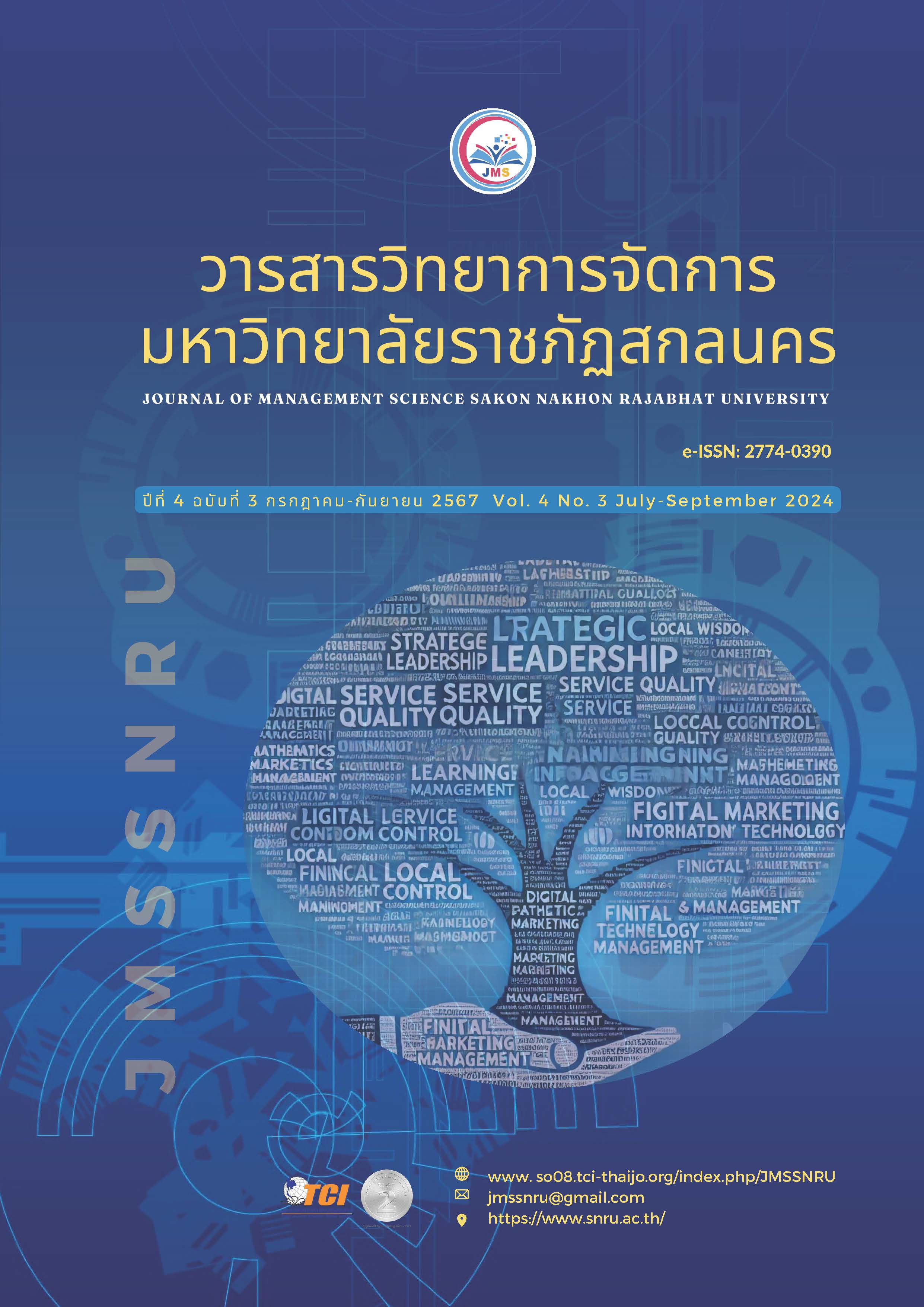TRANSFERRING THE USE OF INFORMATION TECHNOLOGY IN DIGITAL MARKETING FOR THE COMMUNITY ENTERPRISE GROUP, BANG PHLI DISTRICT, SAMUT PRAKAN PROVINCE
Keywords:
transferring the use of information technology, digital marketing, community enterpriseAbstract
The development of digital marketing Information technology transfer has surveyed the need for digital marketing information technology skills among a group of 195 community enterprises. This sampling technique consisted of simple random sampling. The study utilized the components of digital marketing information technology skills to develop learning content under the guidance of the Digital Development Framework (DGA) 7 steps as online lesson was applied with 79 students together with the use of information on technology digital market achievement as follows 1. The digital marketing Information technology skill needed of the community enterprise members consisting of four aspects: 1) the use of modern technology to access customers; 2) the creation of interesting content; 3) the analysis and selection of specific target buyer groups; and 4) the presentation of ownership details. The average score was at the highest level 2. The transfer of digital marketing information technology usage, following the DGA 7-step framework in an online lesson format, had an average appropriateness score was highest level 3. The effectiveness of using digital marketing information technology after learning through the transfer of digital marketing technology skill among the community enterprise group in Bang-Puli Distract, Samut Prakan Province, had an average score higher than the set standard (70%), at 81.89%, with a standard deviation of 9.48. The t-value is 1.78, which is significantly higher than the set standard at the .05 level.
References
จุฬารัตน์ ขันแก้ว. (2562). กลยุทธ์การตลาดดิจิทัลและผลการดำ เนินงานทางการตลาดหลักฐานเชิงประจักษ์จากธุรกิจบริการในประเทศไทย. จุฬาลงกรณ์ธุรกิจปริทัศน์, 41(159), 1-32.
ธีรวุฒิ เอกะกุล. (2558). การวิจัยปฏิบัติการ (Action Research). อุบลราชธานี: บริษัทยงสวัสดิ์อินเตอร์ กรุ๊ป.
ธัญญ์รวี ธรศิริปุณโรจน์, กฤษฎา ตันเปาว์, และกัญญามน กาญจนาทวีกูล. (2562). กลยุทธ์การตลาดสู่ความสำเร็จ ของการประกอบธุรกิจผลิตภัณฑ์สปาผ่านช่องทางดิจิทัลในเขตกรุงเทพมหานครและปริมณฑล. วารสารสมาคมนักวิจัย, 24(1), 72-84.
บุหงา ชัยสุวรรณ. (2558). การสื่อสารการตลาดผ่านสื่อสังคม: ภาพรวมและกรอบแนวความคิด. วารสารนิเทศศาสตร์และนวัตกรรม นิด้า, 2(1), 173-197.
ปราโมทย์ ยอดแก้ว. (2564). การตลาดดิจิทัลกับการเปลี่ยนแปลงวิถีชีวิตใหม่ในสังคมไทย. วารสารสังคมวิจัยและพัฒนา, 3(1), 11-22.
ปรัชญนันท์ นิลสุข. (2556). การบริหารเทคโยโลยีสารสนเทศและการสื่อสารเพื่อการศึกษา. ศูนย์ผลิตตำราเรียน มหาวิทยาลัยเทคโนโลยีพระจอมเกล้าพระนครเหนือ.
พรรณี ลีกิจวัฒนะ. (2558). วิธีการวิจัยทางการศึกษา. กรุงเทพฯ: สถาบันเทคโนโลยีพระจอมเกล้าเจ้าคุณทหารลาดกระบัง.
พิริยาพร สุวรรณไตรย์ และชัยวิวัฒน์ วงศ์สวัสดิ์. (2564). การจัดการความรู้เพื่อพัฒนาผลิตภัณฑ์สมุนไพรพร้อมบริโภค: กรณีศึกษา บ้านผาสุก ตำบลดอนตาล อำเภอดอนตาล จังหวัดมุกดาหาร. วารสารการพัฒนาชุมชนและคุณภาพชีวิต, 9(2), 213-222.
สำนักงานคณะกรรมการการพัฒนาระบบราชการ. (2563). เอกสารความรู้ เรื่องการจัดการความรู้. จาก http://www.dla.go.th/work/km/home/kmstory/kmstory4.htm.
สำนักงานคณะกรรมการพัฒนาการเศรษฐกิจและสังคมแห่งชาติ. (2559). แผนพัฒนาเศรษฐกิจและสังคมแห่งชาติฉบับที่สิบสอง พ.ศ. 2560-2564. กรุงเทพฯ: สำนักนายกรัฐมนตรี.
สำนักงานจังหวัดสมุทรปราการ. (2562). แผนพัฒนาจังหวัดสมุทรปราการ 4 ปี (พ.ศ. 2561-2564). กลุ่มงานยุทธศาสตร์และข้อมูลเพื่อการพัฒนาจังหวัด.
สำนักงานพัฒนาธุรกรรมทางอิเล็กทรอนิกส์. (2557). ผลการสำรวจ Internet User Profile ปี 2557. จาก https://www.etda.or.th/th/Our-Service/Standard-(1)/Certifications-(1)/Example-1/Electronic-certificate.aspx.
อาณัติ รัตนถิรกุล. (2553). สร้างระบบ E-learning Moodle ฉบับสมบูรณ์. กรุงเทพฯ: ซีเอ็ดยูเคชั่น.
อนันตพร พุทธัสสะ. (2563). การพัฒนากลยุทธการส่งเสริมการตลาดดิจิทัล เพื่อสร้างความได้เปรียบในการแข่งขัน ของกลุ่มวิสาหกิจชมุชนในจังหวัดกาฬสินธ์. วารสารวิชาการเทคโนโลยีการจัดการ มหาวิทยาลัยกาฬสินธุ์, (2), 12-21.
Chaffey, D. (2013). Definitions of E-marketing vs Internet vs Digital marketing, Smart InsightBlog, Retrieved February 16, 2020 from https://www.smartinsights.com/digital-marketing-trategy/online-marketing-mix/definitions-of-emarketing-vs-internet-vs-digital-marketing.
Garrison, D. R. (2017). E-Learning in the 21st Century: A Community of Inquiry Framework for Research and Practice (3rd ed). London: Routledge/Taylor and Francis.
Kaur, G. (2017). The Importance of digital marketing in tourism industry. International Journal of Research-Granthaalayah, 5(6), 72-77.
Pei, L., & Wu, H. (2019). Does online learning work better than offline learning in undergraduate medical education? A systematic review and meta-analysis. Medical Education Online, 24(1), 666538. doi: 10.1080/10872981.
Portillo, E., Look, K., Mott, D., Breslow, R., Kieser, M., & Gallimore, C. (2020). Intentional Application of the Taba Curriculum Model to Develop a Rural Pharmacy Practice Course. INNOVATIONS in pharmacy, 11(1), 1-7. doi:10.24926/iip.v11i1.2089.
Winter, S. G. (2002). Understanding dynamic capabilities. Strategic Management Journal, 24(10), 991-995.
Yesilyurt, M., Dogan, M., & Acar llhan, S. (2019). The Meta-Analysis of the Effect of Computer Aided Instruction on Student Attitudes in Science and Mathematics. Journal of Primary Education, 1(2), 57-69.
Downloads
Published
How to Cite
Issue
Section
License
Copyright (c) 2024 JOURNAL OF MANAGEMENT SCIENCE SAKON NAKHON RAJABHAT UNIVERSITY

This work is licensed under a Creative Commons Attribution-NonCommercial 4.0 International License.
An article published in the Journal of Management Science. Sakon Nakhon Rajabhat University is the opinion, copyright and responsibility of the author of the work.







